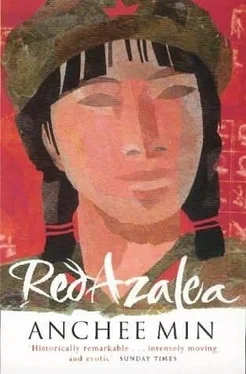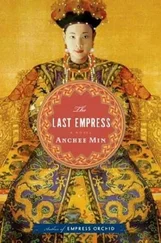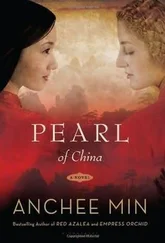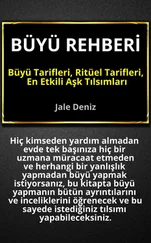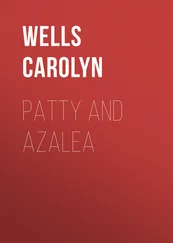The roommates reported her behavior. Yan refused to believe Little Green was insane. She shut us all up. She asked Orchid, Lu and me to go with her, to send Little Green to the farm’s hospital.
We escorted Little Green on a tractor. Four of us holding her as if carrying an animal to a slaughterer’s shop. Yan had her jacket on Little Green. She protected her from the strong wind and covered her as if she were a newborn.
The doctors performed many tests on Little Green but could not figure out what was wrong with her. They told Yan that nothing more could be done and asked her to take Little Green back. Yan roared. She threatened that she would accuse them all of being reactionaries if they did not come up with an acceptable diagnosis. The doctors pleaded with her. Finally, they referred Little Green to a Shanghai hospital where she was diagnosed as having had a nervous breakdown.
When Little Green returned from the hospital months later, I did not recognize her. The drugs that had been prescribed for her had made her gain weight. She was as fat as a bear.
She was again given a bed in my room, where she sat quietly most of the day staring in one direction. Her pupils sometimes moved upward into her skull as if to read her own brain. Her hair was matted. I thought of the evenings when she would wash her hair after dinner and comb and dry it as the sun set. I remembered the song she sang well, “My Motherland.”
There are girls like beautiful flowers,
Boys with strong bodies and open minds.
To build our new China,
We are happily working and sweating together…
I spent the night of my eighteenth birthday under the mosquito net. A nameless anxiety had invaded me. It felt like a sweating summer afternoon. Irritatingly hot. The air felt creamy. It was the ripeness of the body. It began to spoil. The body screamed inside trying to break the bondage. I was restless.
The reeds were sprouting underneath my bed. I had to cut them because they pricked through my bamboo mat and scratched my cheek the night before. I had to stop them or they would hurt me. They had hurt me before. And I had weeded them by the roots. But the reeds were indestructible. They were excessive, saltproof. When I thought they were gone, they were back. They grew from nowhere. It must be the salt. The salt empowered the reeds, I thought. They worked hand in glove. They were the true Red Fire Farmers.
I got down from the bed and squatted. I pulled the reeds out and broke each of them in two. I got back to my net, sealed the curtain, clapped to death three mosquitoes. I pinched them down and looked at the bloody spots on the net. The restlessness overtook me like the growing back of the reeds, from nowhere. It was the body. That must be it. Its youth, the salt. The body and the restlessness worked hand in glove. They were screaming in me, breaking me in two.
I used a small mirror to examine my body, to examine the details of its private parts. I listened to my body carefully. I heard its trouble, its disturbance. It had been trying to capture something, a foreign touch, to soothe its anxiety, but in vain. The body demanded to break away from its ruler, the mind. It was angry. It drove me to where I did not want to go: I had begun having thoughts about men. I dreamed of being touched by many hands. I was disgusted with myself.
It was violent. My body was in hunger. I could not make it collaborate with me. I tossed all night, loneliness wrapped me, anxiety distressed me. I lay on my back, as if stretched on prison bars. My hands all over my body, I did not know how to gain back peace. I could feel a monster growing inside, a monster of desire. It grew bigger each day, pushing my other organs aside. I was defenseless. I could see no way out. The mosquito net was a grave with a little spoiled air. Feeling wounded, I could not cry. I had to guard myself because no one else cried in the room. Had my roommates nothing in common with me? The mosquitoes bit me. I looked for them. They parked in the corners of the net. They were fat and clumsy after bloodsucking. I aimed, clapped. The mosquito flew away. I waited, chased, waited, aimed again and attacked. I clapped one. It lay flat in my hand, bloody and sticky. The mosquito’s blood. My blood. I chased mosquitoes every night. Pinched them all to death. Bloody spots on the net pronounced my success. I played with long-legged mosquitoes. I admired the creatures’ elegance. I would allow one to land on my knee and watch it as it bit me. I watched it insert its tiny strawlike mouth into my skin, feeling its bite. I let it suck, suck to its satisfaction. Then I pinched it with two fingers, firm, and watched its dark brown blood drip.
The killing of mosquitoes didn’t put my mind to rest. My mind was no longer the mind I knew. It was no longer the perfect stainless mind. I began to have thoughts of those disgraced girls, the girls of my middle-school years. As a head of the class, I was assigned to sit by them for semesters to help them get on the right track. I was supposed to correct them and influence them. Though it was never explained to me what was wrong with them, it was known that they were called “La-Sai”-a slang word which indicated that the girls had done shameful things with men and were condemned by those who were moral. These girls had no self-respect. They were called “porcelain with scars.” No one wanted them. They looked forward to no future. They had no future. They were garbage. Placing them next to me showed the generosity of the Communist Party. The Party abandoned no sinners. The Party saved them. I represented the Party.
Sitting next to these girls for seven years, I learned how their hearts were chewed by shame. I learned to never put myself in their position, to stay clear of men. I looked up to the model women the society praised. The heroines in the revolutionary operas had neither husbands nor lovers. The heroine in my life, Yan, did not seem to have anything to do with men either. Did she too feel restless? How did she feel about her body? Recently, she seemed more serious than before. She stopped giving speeches at the meetings. She put on a long face and it remained cloudy all week. I saw her trying to talk to Little Green. Little Green reacted weirdly. She played with reeds or the buttons on Yan’s uniform absentmindedly. She laughed hysterically. Yan looked painfully confused. She shook Little Green’s shoulders. She begged her to listen. But she was talking to a vegetable.
Late in the evening after I finished sharpening my sickle, I went back to my room and sat by Little Green. My roommates were all busy. Like silkworms spinning silk, they were knitting sweaters, bags and scarfs. No one talked.
I went to sit in my net and closed the curtain. I looked at the net ceilings. Loneliness penetrated me. I was no different from the cow I had been working with. I told myself to bear with life. Every day we were steamed by the sun, kneeling on the hard land, planting cottonseeds and cutting the reeds. It dulled me. My mind had become rusted. It seemed not to be functioning. It produced no thoughts when the body sweat hard. It floated in whiteness. The brain was shrinking in salt, drying under the sun.
The cottonseeds we planted climbed out of the soil, like premature creatures with wild reeds all around them. When they first sprouted, they looked like little men with brown caps. They were cute in the early morning, but by noon they were devastated by the bare sunshine and many of them died in the evening before the fog brought them moisture. When they died or began to die, the brown caps fell on the ground and the little men bent sadly. The ones that survived stretched and grew taller. They struggled on for another day. In a week these caps came off and the little men’s heads split themselves in half. These were the first two leaves of the plants. At Red Fire Farm they never grew to be what was expected of them, because the crazy bully reeds sucked all the water and fertilizer. The reeds spread out their arms and took all the sunshine. The cotton plants would bend to the side; they lived in the shadow of the reeds. Their flowers were pitiful. They looked like pinkish-faced widows. The fruit-the cotton bolls they finally bore-were stiff nuts, thin, crooked, chewed by insects, hiding in the hearts of the plants. It was cotton of the lowest quality. Not even qualified to be rated. If some did qualify, the cotton was rated four. We would pick the bolls and put them into bags and ship them to a paper-making factory instead of a fabric-making factory.
Читать дальше
